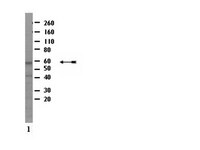07-2054 Sigma-AldrichAnti-MBD1 Antibody, CT
Anti-MBD1 Antibody, C-terminus is a Rabbit Polyclonal Antibody for detection of MBD1 also known as CXXC-type zinc finger protein 3 & has been validated in WB, ELISA.
More>> Anti-MBD1 Antibody, C-terminus is a Rabbit Polyclonal Antibody for detection of MBD1 also known as CXXC-type zinc finger protein 3 & has been validated in WB, ELISA. Less<<Recommended Products
Overview
| Replacement Information |
|---|
Key Specifications Table
| Species Reactivity | Key Applications | Host | Format | Antibody Type |
|---|---|---|---|---|
| H | WB, ELISA | Rb | Purified | Polyclonal Antibody |
| References |
|---|
| Product Information | |
|---|---|
| Format | Purified |
| Control |
|
| Presentation | Purified rabbit polyclonal in buffer containing 0.09% NaN3. |
| Quality Level | MQ100 |
| Physicochemical Information |
|---|
| Dimensions |
|---|
| Materials Information |
|---|
| Toxicological Information |
|---|
| Safety Information according to GHS |
|---|
| Safety Information |
|---|
| Packaging Information | |
|---|---|
| Material Size | 100 µL |
| Transport Information |
|---|
| Supplemental Information |
|---|
| Specifications |
|---|
| Global Trade Item Number | |
|---|---|
| Catalog Number | GTIN |
| 07-2054 | 04053252675669 |
Documentation
Anti-MBD1 Antibody, CT SDS
| Title |
|---|
Anti-MBD1 Antibody, CT Certificates of Analysis
| Title | Lot Number |
|---|---|
| Anti-MBD1, C-terminus - NG1598684 | NG1598684 |







